01 Jan Morocco — The Gunpowder Game
Essaouira is a Medieval walled city on the rocky Atlantic coast of Morocco.
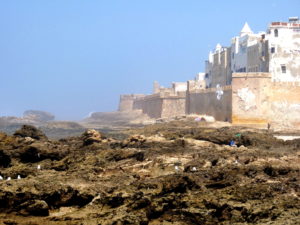
Inside the walls are winding, shadowy alleys, Moorish arches and a souk with a kaleidoscope of goods that don’t seem all that different from the goods you would have seen in the same stalls hundreds of years ago.
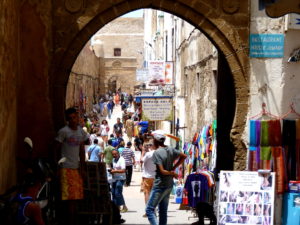
The walls were built in the early 1500’s by Portuguese soldiers who lasted four years before being kicked out by Moroccans. Then rebuilt in the 1760’s by a French engineer working for Mohammad III. Nowadays, rather than just being a place to clamber onto bronze cannons and scan the horizon for Portuguese warships, the ramparts have become an open air market.
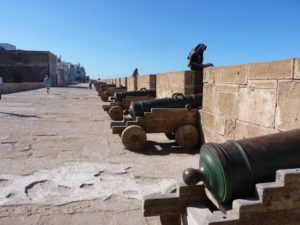
Which our daughter and her husband discovered when a very skinny man with a tray of pastries sidled up and whispered, “Happy cakes?” A policeman was standing not more than ten yards away with his back ostentatiously turned their way. “You want to be happy?” the skinny man said.
They daughter shook their heads. They weren’t sure the pistol on the policeman’s hip was loaded. After one of the assassination attempts on the old King, the police weren’t supposed to carry loaded guns. But who knew? “Super happy cakes?” the skinny guy gestured at a row of pastries on one side of the tray. Our daughter and her husband shook their heads again, and Skinny Guy walked across the rampart to a teenager in a Superman T-shirt.
Skinny Guy and the kid stood back to back negotiating in loud voices while the policeman made a point of not looking. After a while, the kid pulled out a roll of dirhams and began counting bills, but the policeman never seemed to notice. Nobody in Essaouira ever offered happy cakes to Peg and me and it was kind of disconcerting, like getting a senior discount without asking.
Outside the walls is a fishing port
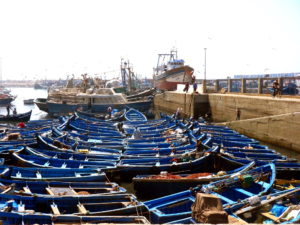
populated with identical blue skiffs, and a sunlit beach where generations of French families once enjoyed themselves, and Moroccan families since the Prophet first came to this land.
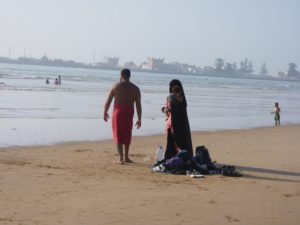
It’s hard to imagine a more unlikely mixture of cultures but, sixty-five years after the French departed, you can still see traces of their influence.
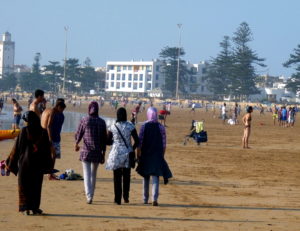
Once while we were in Essaouira, we heard gunfire. Volleys of gunfire coming from down the beach, and went to see.
What we saw was scores, maybe hundreds, of men with muzzle-loading rifles, and boys and horses lined up next to the ocean. We did the obvious thing and found a spot in front of the seawall and sat down to watch.
A squad of horsemen turned in our direction and, as it they’d discovered Christians, charged right at us,
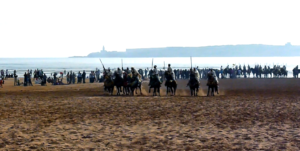
yelling and ululating. And, it was easy to imagine, shouting “God is Greater.”
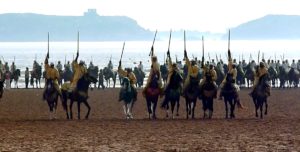
Coming closer and closer and closer still, until they were almost on top of us before firing their rifles.
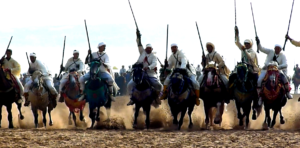
Then, just as we were about to lunge for the sea wall,
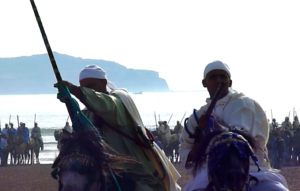
wheeled aside and back toward the ocean
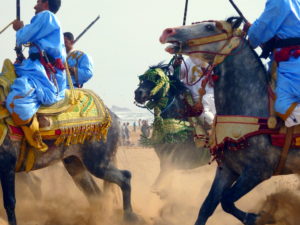
while another group charged across the beach at us.
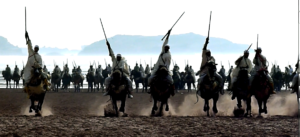
And another,
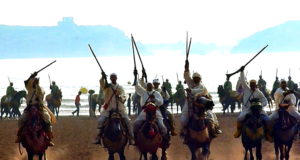
and others,
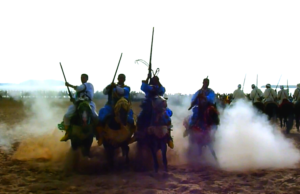
for hours. We had blundered into lab al baroud, the Gunpowder Game.
The Gunpowder Game is as traditional and stylized as bull fighting, with roots deep in the history of North Africa. And probably does have something do do with killing Christians. But, now, it’s been tamed and contained and made into shows for busloads of tourists to watch from bleachers, the way citified visitors from Imperial Rome traveled to Sparta to feel all shivery over reenactments of brutal coming-of-age rituals no youth had gone through for hundreds of years.
But not in Essaouira. Not that day. Not on that beach. On that day, on that beach, it wasn’t a pageant. It wasn’t a show for tourists, it was the real thing. It was a chance for men to show off their horsemanship.
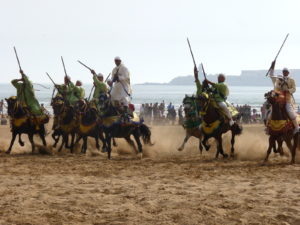
And their horses
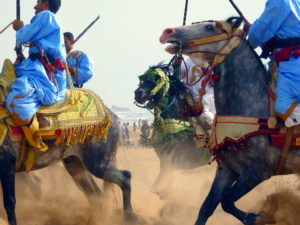
and, for an afternoon, to be the men their fathers had been when they cast out the French. And their fathers before them when they’d brought the Word of God to this land. It was like Civil War reenactors, I thought.
But, now, I think it was more than that because, down near the water when Peg and I got a good look, there weren’t just men on horses, there were families.
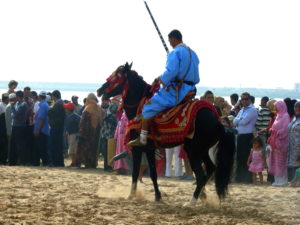
Wives and kids and old folks all come to take part because it was their heritage as well.
It was, when I thought some more about it, like the Fourth of July. Except not watered down and made anemic with ordinances against fireworks. But sturdy and full-blooded with men firing actual rifles, then handing them to ten-year-old sons to pour in more powder, and ram home more wads, and hand them back so the fathers could charge across the beach, and yell and fire one more time. And the sons could watch, and take part, and await the day they’d hand down their fathers’ rifles to their own sons. Seeing it made me nostalgic for a world I’d never known. But, mostly, it looked like fun.


No Comments